The EU is poised to make an important distinction in how it views the relatively new technology of genetic modification. Until now, the growing of all genetically modified crops within the EU has been prohibited, with very limited exceptions for research purposes. Indeed, the importation of genetically modified crops grown elsewhere has been subject to strict supervision, with approval of every crop modification required, both at a scientific and a political level.
Now, however, the EU is poised to make an important distinction, which may end this strict ban. Under a new proposal, gene-edited crops will be classified as conventional rather than genetically modified. And many environmental groups are strongly opposed to any such change.
Gene editing, as I understand it, differs from genetic modification in that it works with the genetic information within a plant, reprogramming the plant to maximise the genetic potential it contains within its DNA.
It does not involve the introduction of external genetic information.
Perhaps the opposition of environmental groups to genetic modification being used in food production dates back to when their research and commercial application was dominated by big pharmaceutical companies, most notably Monsanto with its Roundup-ready modified soya, maize and sugar beet.
Claims that “superweeds” have developed as a result of GMOs sounds like the stuff of science fiction, but it’s much more prosaic than that. Weeds resistant to Roundup have emerged, but that’s following monocropping of Roundup-resistant crop varieties over many years, with an overreliance on glyphosate for weed control.
That doesn’t mean we should throw the baby out with the bathwater.
The resistant weed’s development was related to bad farming practice, not the fact that the crop had been genetically altered.
Most people are now realising that if we are to grow enough food for nine billion people from a smaller land base with less fertiliser and less pesticides, we need help.
With farming’s toolbox being stripped out so significantly, it seems perverse that we would decline the vise grip that gene editing can be.
Farmers in Northern Ireland will be closely watching this debate. Despite Brexit, they are still bound by EU standards and rules in relation to food production.
Perhaps farmers and environmentalists can find common cause. Monsanto no longer exists, but it is in everyone’s interests that gene-editing research is led by public bodies rather than commercial interests.
Research could focus on making crops more resilient against difficult weather and growing conditions. It could help them cope with fungal infections and pests.
That would be more constructive than an attack of the vapours over a false narrative.









SHARING OPTIONS